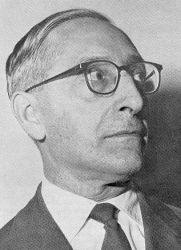Giuseppe Brotzu
Giuseppe Brotzu (born January 24, 1895 in Ghilarza ; died April 8, 1976 in Cagliari ) was a Sardinian doctor and politician . He discovered the mold Acremonium chrysogenum (then Cephalosporium acremonium ) and with it the cephalosporins, which are still used as antibiotics today . As part of a program to eradicate malaria in Sardinia, he became a local politician and later also mayor of the Sardinian capital Cagliari.
life and work
Brotzu studied medicine in Siena and received his university degree in 1919. From 1925 to 1932 he went to the University of Bologna as a private lecturer . In 1934 he was appointed professor in the Faculty of Hygiene at the University of Modena , where he remained until 1966. From 1936 to 1945 he was also rector at the University of Cagliari and worked as commissioner for the public health system during the eradication campaign for the malaria pathogen in Sardinia.
His main scientific achievement was the discovery of cephalosporin-C as the first representative of the cephalosporins in the mold Acremonium chrysogenum (then Cephalosporium acremonium ) in 1945. Breadzu took water samples from the Mediterranean near a sewer system on the assumption that the sewage was polluted by various pathogens their natural enemies and usable antibiotics must also be detectable. He noticed that young men swam there and ate raw fish without contracting typhus, which was then widespread there. In his samples he was able to detect Acremonium chrysogenum and its antibacterial effect on gram-negative bacteria such as Salmonella and Brucella melitensis . He published his results in the little-noticed journal Lavori dell'Istituto di Igiene di Cagliari and sent the samples to the University of Oxford's Pathology Laboratory . There they were examined by Edward Abraham , who had already worked on the team of Nobel Prize winner Howard Walter Florey . This was able to successfully isolate the cephalosporin-C and use it as an antibiotic. Giuseppe Brotzu was awarded an honorary doctorate from the University of Oxford in 1971 for this discovery .
As part of the fight against malaria in Sardinia, Brotzu primarily campaigned for the drainage of swamps and modern agriculture in order to reduce the mosquito population. He also devoted himself to fighting other infectious diseases such as tuberculosis and contributed to the construction and modernization of hospitals, waterworks and slaughterhouses. 1955 to 1958 he was chairman of the Sardinia region , from 1960 to 1967 he was mayor of the city of Cagliari. In 1976 Giuseppe Brotzu died in his hometown.
Publications
- Ricerche su di un nuovo antibiotico. Lavori dell'Istituto di Igiene di Cagliari 1948 (PDF)
literature
- A. Riva, B. Orrù, E. Fruciano: Giuseppe Brotzu and the Discovery of Cephalosporines , 8th European Conference of Medical and Health Libraries, Cologne, September 16-21, 2002. (PDF)
- G. Bo: «BROTZU, Giuseppe» . In: Dizionario Biografico degli Italiani, Vol.XXXIV, Roma: Istituto della Enciclopedia Italiana, 1987
Web links
- Brief description in a poster session of the German Central Library for Medicine (PDF)
- Brief portrait of the Facoltà di Medicina e Chirurgia of the University of Cagliari (English)
| personal data | |
|---|---|
| SURNAME | Brotzu, Giuseppe |
| BRIEF DESCRIPTION | Sardinian medic and politician |
| DATE OF BIRTH | January 24, 1895 |
| PLACE OF BIRTH | Cagliari , Sardinia |
| DATE OF DEATH | April 8, 1976 |
| Place of death | Cagliari , Sardinia |
